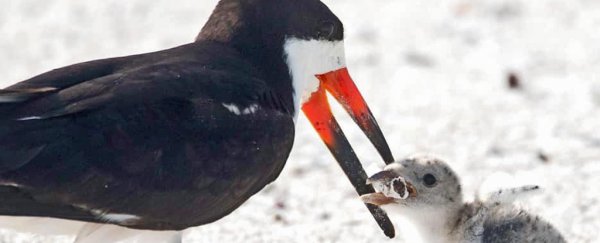As human influence extends into the world's ecosystems, some species are hit increasingly hard - and the latest symbol for this problem is an unsuspecting black skimmer parent, mistakenly trying to feed its baby trash.
"These birds feed by skimming along the water with their beaks open," the photographer, Karen Mason, explained on Facebook where she shared these photos. "When the bottom mandible touches something, the top one snaps shut. They don't see what they are getting."
This hunting strategy has served black skimmers (Rynchops niger) well in the past. It fuelled their rebound from near extinction after humans once hunted them to the brink.
But now that we have choked many parts of the planet with rubbish, the bird's method of indiscriminately capturing dinner may prove very unhealthy, if not deadly. It already has for many sea birds around the world.
 (Karen Mason/Facebook)
(Karen Mason/Facebook)
Karen Mason came across this skimmer family on St Pete's Beach in Florida, while volunteering for the National Audubon Society - helping to educate people about the birds over summer.
"When I took the picture I knew it wasn't a fish but didn't know it was a cigarette until I got home and put it on my computer," she told ScienceAlert.
"I was horrified and put it on a few photography and conservation websites that I use on Facebook."
 (Karen Mason/Facebook)
(Karen Mason/Facebook)
This flavour of trash is particularly nasty, as decaying cigarette filters release chemicals such as nicotine, arsenic and lead. The way the plant cellulose used to make these filters is processed makes their disintegration stubbornly slow, not unlike plastic.
Some birds will use cigarette butts in their nests. As Mason explains, "I saw some lining the entrance to a burrowing owl burrow."
Strangely, this may actually provide some benefits, with a study showing the chemicals from smoked cigarettes can repel parasites from the nests of urban birds. But this comes with consequences, too - the same compounds also caused a higher level of chromosomal damage in the birds.
A recent report from the Ocean Conservancy says cigarette butts are even more commonly found on the beaches they monitor than straws or plastic bottles. They're the most abundant type of ocean trash.
There are now ways to recycle cigarette waste in some places; even if that option isn't available, it really shouldn't be that hard to dispose of the butts properly.
We don't always get to see the direct consequences of our rubbish. As it's now showing up more and more frequently inside different animals, including ones we eat, every tragic case is also a reminder that trash doesn't just harmlessly go away.
"It's time we cleaned up our beaches and stopped treating them like one giant ashtray," said Mason.
